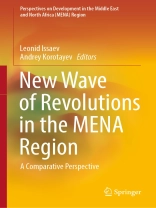This book offers a comparative perspective on the new wave of revolutions in the MENA region. Recently, a new wave of revolutions has swept the Middle East and North Africa (MENA) region, comparable in some respects to the events of the Arab Spring. Revolutionary events have significantly changed the political regimes in Sudan, Algeria and Mali, while Lebanon and Iraq have also witnessed serious revolutionary episodes. Further, a new quality of protests has manifested in Iran, Egypt, Morocco and Jordan.
Presenting a variety of country studies, this book identifies similarities and differences between the events of the Arab Spring and the current upheavals in the MENA region and examines their causes and world-system context. It also analyzes the motivating forces, goals and organizational forms of the protesters and other actors involved, as well as the political and economic consequences of these revolutionary events. Moreover, it seeks to understand whysome countries that were actively involved in the Arab Spring have remained largely unaffected by these developments. The book appeals to scholars of political science with a focus on comparative politics, Middle Eastern politics and political sociology.
विषयसूची
1. Introduction. New Wave of Revolutions in the MENA Region in the Global Perspective.- 2. Sudan’s December Revolution and the Demise of the Al Bashir Regime.- 3. The Crisis of the Rentier State: How the Revolution of Smiles has Brought Down the Sultanistic Regime in Algeria.- 4. 17 October (2019) Revolution in Lebanon, A preliminary analysis.- 5. Revolutionary Protests in Iraq in the Context of Iranian-American Confrontation.- 6. The Roots of the New Wave of Protests in Jordan.- 7. Tunisia. Revolution of Ballot Boxes?.- 8. Egyptian Protests 2019: Harbingers of a New Revolution?.- 9. Revolutionary Events in Mali, 2020–2021.- 10. Sanctions and the Socio-Economic Roots of Iran’s Domestic Instability (2010–2020).- 11. Why has the recent wave of revolutions in the MENA region missed Kuwait and Bahrain?.- 12. Conclusion. New Wave of Middle Eastern Revolutionary Events in the World System Context.
लेखक के बारे में
Leonid Issaev is Senior Lecturer and Deputy Chair of the Laboratory for Sociopolitical Destabilization Risk Monitoring at HSE University (Russia) and Senior Research Fellow at the Institute for African Studies of the Russian Academy of Sciences in Moscow. He is a member of the Scientific Council of the Russian Political Sciences Association (RPSA) and the Russian Sociological Society, he teaches courses on Islamic political philosophy and on political systems and political processes in the Arab world.
Andrey Korotayev is Head of the Laboratory for Sociopolitical Destabilization Risk Monitoring at HSE University (Russia) and Senior Research Professor at the Institute for African Studies of the Russian Academy of Sciences in Moscow. He is the author / co-author of over 600 scholarly publications, including such monographs as
Great Divergence and Great Convergence (Springer, 2015) and
Islamism, Arab Spring, and the Future of Democracy. World System and World Values Perspectives (Springer, 2019).












